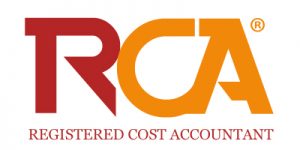 Registered Cost Accountant (RCA) Program Overview
Registered Cost Accountant (RCA) Program Overview
The RCA qualification caters those requiring essential skills as an accounting support officer and bookkeeper. Students gain practical knowledge of a variety of accounting and bookkeeping skills necessary for the workplace, including preparing financial reports and budgets and basic costing. Bookkeepers and cost accountants are necessary across all industries
The Registered Cost Accountant (RCA) program is part of the Graduate Program and is available to those satisfactorily passing a University entrance examination of a particular country (e.g. SATs, International Baccalaureates; Advanced Levels; TERs etc.). The program consists of 4-units undertaken after completing the CAT (Stage 1) program.
| ICMA Subjects Registered Cost Accountant |
|
| Stage 2 (RCA Program) | Financial Economics International Business Law & Governance Business Analysis & Audit International Business Taxation |
ICMA’s Registered Cost Accountant (RCA) credential has been assessed for equivalency on the New Zealand Qualifications Framework (NZQF) at the Level 5 (Diploma) by the New Zealand Qualifications Authority (NZQA).
The Registered Cost Accountant (RCA) program can be done via the Global Business School.
Stage 2
Unit 5 : Financial Economics
Objectives :
On completion of this subject students should have a basic understanding of the methodology and principles of economics; have a basic understanding of micro and macroeconomics; be able to present arguments and make decisions in the economic environment. The techniques available to evaluate financial performance and risk are also covered.
Synopsis :
- describe the economic and financial environment within which businesses and government organizations operate
- explain how market systems operate and the role of specialist institutions within the markets
- appreciate reports in the financial press about economic developments, the financial markets and their implications for industry and commerce
- understand the techniques available to evaluate financial performance and risk.
Unit 6 : International Business Law and Governance
Objectives :
On completion of this subject students should be able to appreciate alternative business enterprises internationally, namely sole proprietorships, partnerships, companies and trusts; recognise the general laws which apply to such business entities internationally and appreciate the development of corporate governance regulation in different countries. The applicable comparative legislation is that of the country the student is sitting the examinations in.
Synopsis :
- explain the principles of business law which underpin competence in management accounting
- apply legal principles to business problems
- advise managers and directors on the main legal issues which arise in the course of a management accountant’s work.
- understand the need for corporate governance regulation.
Unit 7 : Business Analysis and Audit
Objectives :
On completion of this subject students should be able to revise basic mathematical concepts and skills so that they are able to understand and perform a wide variety of basic mathematical processes that are necessary for analyzing business operations; become competent in the basic use of statistical tools and techniques their applications to solve problems in business; and become competent in the use of statistical data in order to be more effective in business planning, forecasting, performance evaluation, auditing and management.
Synopsis :
- appreciate the basic management of operations
- apply relevant management science techniques in practical business situations
- understand how some techniques of managerial economics are used in business decision making
- derive management information from data using computers where appropriate to help solve problems.
- use statistical information in numerous business applications such as planning, forecasting, performance evaluation, and internal auditing.
Unit 8 : International Business Taxation
Objectives :
On completion of this subject students should be able to identify the taxation issues that arise from a range of transactions and to understand international tax issues; including assessable income and exempt income; allowable deductions; special classes of taxpayers including trusts, partnerships and companies; objections and appeals; capital gains tax; fringe benefits tax; superannuation; eligible termination payments; tax collection; and tax avoidance.
Synopsis :
- advise managers on the application of the principles of taxation to decision making
- apply the rules of statute and case law through computation and advise on compliance
- apply taxation knowledge to the process of formulating corporate plans.




Stay In Touch